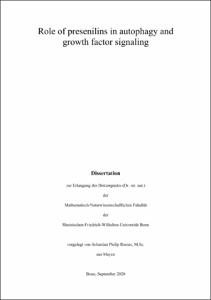Role of presenilins in autophagy and growth factor signaling

Role of presenilins in autophagy and growth factor signaling

| dc.contributor.advisor | Walter, Jochen | |
| dc.contributor.author | Roeser, Sebastian Philip | |
| dc.date.accessioned | 2021-02-08T12:42:49Z | |
| dc.date.available | 2022-02-15T23:00:19Z | |
| dc.date.issued | 08.02.2021 | |
| dc.identifier.uri | https://hdl.handle.net/20.500.11811/8912 | |
| dc.description.abstract | Alzheimer's disease is the most common neurodegenerative disease and affects millions of people worldwide. To date, no efficient therapies are known for a cure. As people suffering from diabetes mellitus type 2 have an increased risk to develop AD and PS proteins affect autophagy, this study combines these characteristics by further evaluating how γ-secretase/PS proteins affects the autophagy-, insulin- and IGF1-related PI3K/Akt/mTOR signaling pathway.
For that, differentiated SH-SY5Y- and PS-deficient MEF cells were treated with DAPT for pharmacological inhibition of the γ-secretase, as well as starvation medium, insulin or IGF1 for induction of the PI3K/Akt/mTOR signaling pathway. Furthermore, additional pharmacological treatments using rapamycin, bafilomycin A1, 3-MA and chloroquine were performed for further modulations of the pathway. This study indicates that starvation-induced autophagy affects subcellular distributions of PS proteins as well as subcellular distributions and expression of IGF-R and I-R. Furthermore, PS-deficiency leads to impaired autophagic clearance, lysosomal accumulation and highly impaired phosphorylation of Akt. Most interestingly, impaired autophagic clearance in PS-deficient cells can be highly improved by insulin- and IGF1 treatment. Moreover, the results indicate that all observed dysfunctions depend on PS-expression in a γ-secretase activity- independent manner and most probably independent of Aß generation. This study successfully demonstrates that PS-deficient cells show a highly impaired adaptation to environmental stress, which might subsequently lead to apoptosis and neurodegeneration independent of Aß generation and γ-secretase activity. However, the exact mechanisms on how PS proteins interact with the PI3K/Akt/mTOR signaling pathway independently of their catalytic activity need to be further elucidated. Moreover, it is still unclear, whether increased autophagic clearance induced by insulin- and IGF1 treatment in PS-deficient cells leads to an improvement of their cellular homoeostasis. Independent of the most preferably pharmacologically targeted Aβ, hyperphosphorylated tau and γ-secretase itself, this study highly indicates the PI3K/Akt/mTOR signaling pathway to be an important target for a possible pharmacological treatment of AD. | en |
| dc.language.iso | eng | |
| dc.rights | In Copyright | |
| dc.rights.uri | http://rightsstatements.org/vocab/InC/1.0/ | |
| dc.subject | Autophagie | |
| dc.subject | Alzheimer Demenz | |
| dc.subject | Insulin | |
| dc.subject | IGF1 | |
| dc.subject | Präsenilin | |
| dc.subject | γ-sekretase | |
| dc.subject | Neurologie | |
| dc.subject | Autophagy | |
| dc.subject | Alzheimer's dementia | |
| dc.subject | Presenilin | |
| dc.subject.ddc | 570 Biowissenschaften, Biologie | |
| dc.title | Role of presenilins in autophagy and growth factor signaling | |
| dc.type | Dissertation oder Habilitation | |
| dc.publisher.name | Universitäts- und Landesbibliothek Bonn | |
| dc.publisher.location | Bonn | |
| dc.rights.accessRights | openAccess | |
| dc.identifier.urn | https://nbn-resolving.org/urn:nbn:de:hbz:5-61175 | |
| ulbbn.pubtype | Erstveröffentlichung | |
| ulbbnediss.affiliation.name | Rheinische Friedrich-Wilhelms-Universität Bonn | |
| ulbbnediss.affiliation.location | Bonn | |
| ulbbnediss.thesis.level | Dissertation | |
| ulbbnediss.dissID | 6117 | |
| ulbbnediss.date.accepted | 26.01.2021 | |
| ulbbnediss.fakultaet | Mathematisch-Naturwissenschaftliche Fakultät | |
| dc.contributor.coReferee | Hofmann, Michael | |
| ulbbnediss.date.embargoEndDate | 15.02.2022 | |
| ulbbnediss.contributor.gnd | 1252094353 |
Dateien zu dieser Ressource
Das Dokument erscheint in:
-
E-Dissertationen (4397)




